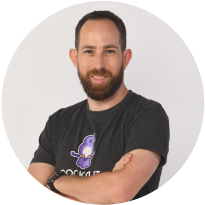1. Focusing on the competition instead of your own company
“I’ve made many, many mistakes in my life and always found a way to focus on what I learned from it so there’s never a regret I can’t move on from. In our early days as founders at Shaker, we gave too much attention to our competition. This was for good rational reasons: we were a small team chasing a big vision in a world full of resourceful companies. Yet in the end, this led us to make decisions based on fear and not out of courage. It’s important to know your market and understand your competitors’ strategy but at the same time, it’s all about being the best version of yourself and focusing on your own execution.”
– Gad Maor, Co-Founder & CEO at StoreMaven, link to column https://www.startupforstartup.com/founders-column/gad-maor/
2. Focusing just on short term success
“I make mistakes every day, but I keep reminding myself that I am the sum of all good choices and bad choices I made, and if I’m happy with who I am, I shouldn’t be afraid of making mistakes and learning how to be better.
However, there was one repetitive mistake it took me a long time to learn from. Throughout Tailor Brands’ life cycle I often pushed for getting fast results. My itching to succeed jeopardized long term aspirations with shortsighted gains. This was all done under a rational justification; there were times when we were fighting for our company’s life every day, and if we could not figure out a way to see tomorrow there was no real rationale for hypothesizing about the next year. However, in hindsight, I could have balanced these needs much more, and accelerate our growth faster. I learned I should always keep an eye on the next year, even if tomorrow is uncertain.”
– Yali Saar, Co-Founder & CEO at Tailor Brands, link to column –https://www.startupforstartup.com/founders-column/yali-saar/
3. Selling shares early on
I make tons of mistakes on a day to day basis and this is part of growing and scaling. A few years back, in the previous company I founded, I sold 30% of the company to the wrong partner. I ended up buying back my shares 2 years later, it was a very tough lesson that taught me to follow my instincts but also listen to my lawyers.
– Eynat Guez, Co-Founder & CEO at Papaya Global, link to column –https://www.startupforstartup.com/founders-column/eynat-guez/
4. Solving problems that do not exist
Hiring is a big part of a startup’s life cycle. In many ways good hires will hugely impact the chance of a startup to succeed. One mistake I made is to create a role for an employee we wanted to retain. He was a great sales representative that was worn out of sales, but wanted to stay in the company and I wanted that too. So I created a role that we thought would be great for him based on his skills.
We quickly found out that the role was not really a full time job and wasn’t clear enough, and that this employee was not being set up for success. He ended up leaving the company unfulfilled and we were disappointed. The lesson from this is to always remember to only find a solution to a problem, and to not try to solve problems that don’t exist. Hiring someone, or re-positioning an existing employee, should only happen after a clear problem is apparent and a decision has been made that the right resource to solve that problem is hiring.
– Nitzan Cohen Arazi, Co-Founder & COO at Joll, link to column – https://www.startupforstartup.com/founders-column/nitzan/
5. Trying to reach perfection without getting feedback
I have millions. Before starting monday.com I closed a startup, and my biggest failure is that I created a product that nobody wanted. I worked on it for over a year and had lots of misconceptions in my head – that the product had to be fully ready before being released, that it needs to be improved, that a lot of features are missing etc. I learned that I should fail often, get feedback often, and then build something people actually want, instead of investing too much in building scalable technology or a super-impressive infrastructure, because nobody cares.
A big part of our DNA at monday.com is embracing failure. We want to move fast because we understand that execution is a big part of being successful. It means that you are confident, it means you know what you are doing, and that you can absorb failure – all of these things that we hadn’t done in the past.
– Eran Zinman, Co-Founder & CTO at monday.com, link to column – https://www.startupforstartup.com/founders-column/royanderan/





